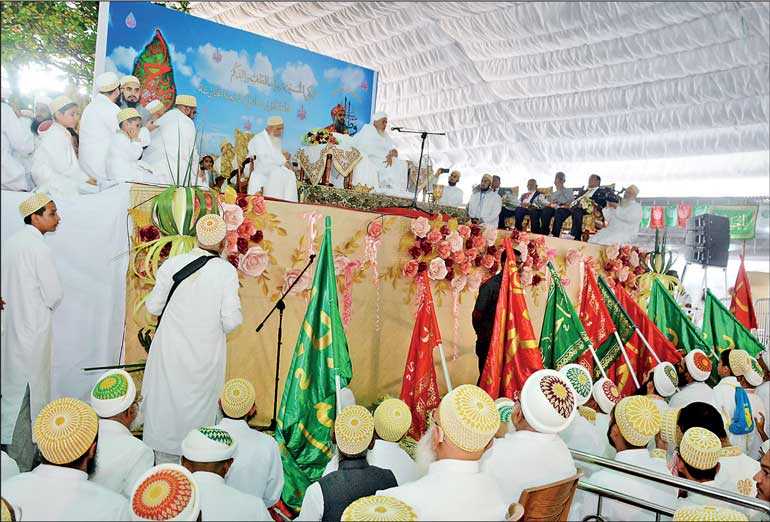Tuesday Feb 17, 2026
Tuesday Feb 17, 2026
Wednesday, 11 September 2019 00:00 - - {{hitsCtrl.values.hits}}

The 2019 conference of Bohra Muslims, held in Colombo for 10 days from 1 September, attended by more than 20,000 members of that community from several parts of the world, and with the theme, ‘We Believe in Sri Lanka,’ was a remarkable event for several reasons. 
Firstly, it was the first conference of that size organised by this tiny Shia Muslim community of between 2,000 and 3,000 souls. Secondly, it was unique in the sense that it was held in a country whose nearly two million Muslim population is overwhelmingly Sunni. Given the ongoing tensions between these two sects in Islam internationally, the choice of the Buddhist majority Sri Lanka was apt.
Thirdly, it took place at a time when the Muslim community in general is living in a state of anguish because of anti-Muslim protests and demonstrations organised by several Buddhist supremacist groups. Anti-Muslim feelings have increased in intensity since the infamous Easter terror unleashed by a bunch of murderous Muslim lunatics. Historically speaking such anti-Muslim feelings in Sri Lanka are more an exception than normal.
Fourthly, the conference is a welcoming event to a desperate tourist industry, which has been struggling to make ends meet after the infamous Easter, and the conference is reported to have brought in around $ 31 million or Rs. 900 million as foreign exchange within a couple of weeks to a debt-burdened economy.
What is even more remarkable in the current political climate of the country is the unusual tough stand that the Government and its security apparatus had taken to check any disruption to this Muslim event, which was expected to come from the supremacist groups like Ravana Balakaya, Sinhala Ravaya and Bodu Bala Sena.
It was reported that the Colombo Magistrate Court issued a special order against any unruly demonstrations in the vicinity of the conference, and that that order was handed in person by the Police to the leaders of these organisations.
The conference ended successfully and without any incident, and the Government and its Justice Department deserve to be congratulated. It should be noted in passing that except the JVP Leader Anura Kumara Dissanayake, no other political stalwart had the courage to condemn in public the demonstrations planned by the supremacists.
Be that as it may, the question arises as to why the same Government and its security arm did fail to take the same stand when the same supremacists went on rampaging against Muslims, ransacking their businesses and destroying their property in Negombo, Chilaw, Kurunegala and other towns, in the immediate aftermath of the bloody Easter?
Is there a double standard here, one towards minority Shias and another towards majority Sunnis? The answer seems to be obvious, money talked louder and forced the Government to act in the first case while politics dictated inaction in the second. Adding the two together did the country and its economy gain in net terms? Certainly not.
To take the financial aspect first, money gained through the Bohra Conference is only part of the revenue lost through the Easter carnage and subsequent anti-Muslim unrest. From all accounts it is now clear that that carnage could have been prevented had the authorities acted promptly on information received through domestic and foreign sources.
Government failure killed hundreds of innocent lives, traumatised thousands more and destroyed millions of rupees worth of property. From the point of view of the economy, the tourist industry suffered immeasurably and Muslim businesses were crippled by organised boycotts and self-enforced closures.
Furthermore, the Bohra community, though tiny, yet is relatively affluent. Members of that community are mainly engaged in wholesale textile business and trade in diamonds and precious stones. An average Borah Muslim is better off economically in comparison to an average Sunni Muslim.
From the 1950s, the leaders of the left parties tirelessly accused the Borah merchants for financing the capitalist UNP. Money therefore talked louder and Government promptly acted to protect the conference. Looking from another angle, through this conference, Bohra Shias helped the tourist industry to recover at least part of the losses it suffered at the hands of Sunni terrorists, and therefore the conference deserved Government support.
Politically however, this support was a calculated strategy on the part of Government to win back the sympathy of Sunni Muslims, which it lost because of the failure to protect them during those tumultuous post-Easter weeks. How does one rationalise this strategy?
Electorally and in terms of voting strength, Bohra Shias do not count even 1% of the Muslim vote bank. However, in popular Buddhist image Bohra Shias are known for their belief in Sufism and meditative practices, which are resonant with the spiritual ethos of Buddhism. Thus, support to Shia Muslims would not damage the Government’s share of Buddhist vote bank more than marginally.
On the contrary, the popular and historic image of the Sunni majority as a sociable and tolerant people of Sri Lanka has suffered significantly in recent times, at least since 1980s, because of certain imported but religiously framed cultural practices, which I have discussed in detail in previous contributions to this journal. (See for example, ‘From the Safest to an Insecure Sri Lanka for Muslims,’ Colombo Telegraph, 6, 9 and 14 March 2018).
Unfortunately, the tag of Wahhabism, an eponymous ultra-conservative Saudi Arabian official Islam, has come to be attached to identify the behaviour and practices of this sect. Wahhabism, as a religious ideology is anathema to Buddhist supremacists since they equate that ideology with Islamist terrorism. There is now a Buddhist clergy led campaign advocating the eradication of this ideology from the country.
Rev. Galagoda Aththe Gnanasara, the Secretary of Bodu Bala Sena, who was imprisoned for contempt of court but pardoned by President MS and released, and Rev. Athuraliye Rathana, a parliamentarian and founding member of JHU, are leading this campaign. It was in this politically charged and religiously volatile context that Prime Minister Wickremesinghe and President Sirisena calculated their odds in sympathising or otherwise with Muslims during those post-Easter stormy weeks.
With a Presidential Election looming, in which both leaders want to contest, they decided to sacrifice the interests of Muslims to minimise damage to Buddhist vote bank, over which the supremacists are feared to be commanding significant influence. This was also the reason why even the opposition parties, with the exception of JVP, are at least silently courting the supremacists at the expense of Muslims.
On the whole, the Government’s discriminatory behaviour between minority Shias and majority Sunnis on the one hand, and between Muslims in general and supremacists on the other has certainly estranged its support among Muslim voters. In that sense, the action it took to stop the anti-conference demonstrations was too little too late. This does not mean that Muslim voters are going to throw their support behind the Opposition.
In one of his recent public addresses, MP Wimal Weerawansa did not mince his words when he spoke that, if Muslims were to live in peace and carry on with their ordinary businesses they should vote Gotabaya for the presidency. By that, did he imply that it was Gotabaya who was behind the recent anti-Muslim incidents and that therefore he was the only man to put a stop to them? One would wish Weerawansa did not mean it, but Muslim voters are scrutinising every word of his irresponsible utterance.
The three contending major parties, UNP, SLFP and SLPP have lost so much credibility in recent years that voters, especially those of the two minority communities, feel totally betrayed. There is therefore a desperate search for a third or fourth alternative. As far as Muslims are concerned they may not even follow the advice of their own leaders this time. The two Muslim parties SLMC and ACMC exist more for the wellbeing of the leaders, their families and cronies than for the advancement of the community.
The time has come for Muslims to think outside the usual circle. What should they do? The idea of nominating a Muslim as a candidate at the Presidential Election, apparently not to win but to gather 3,000,000 votes, to decide who will be the next president is a short-sighted gamble that can back fire badly. More on this later.
(The writer is attached to the School of Business and Governance, Murdoch University, Western Australia.)